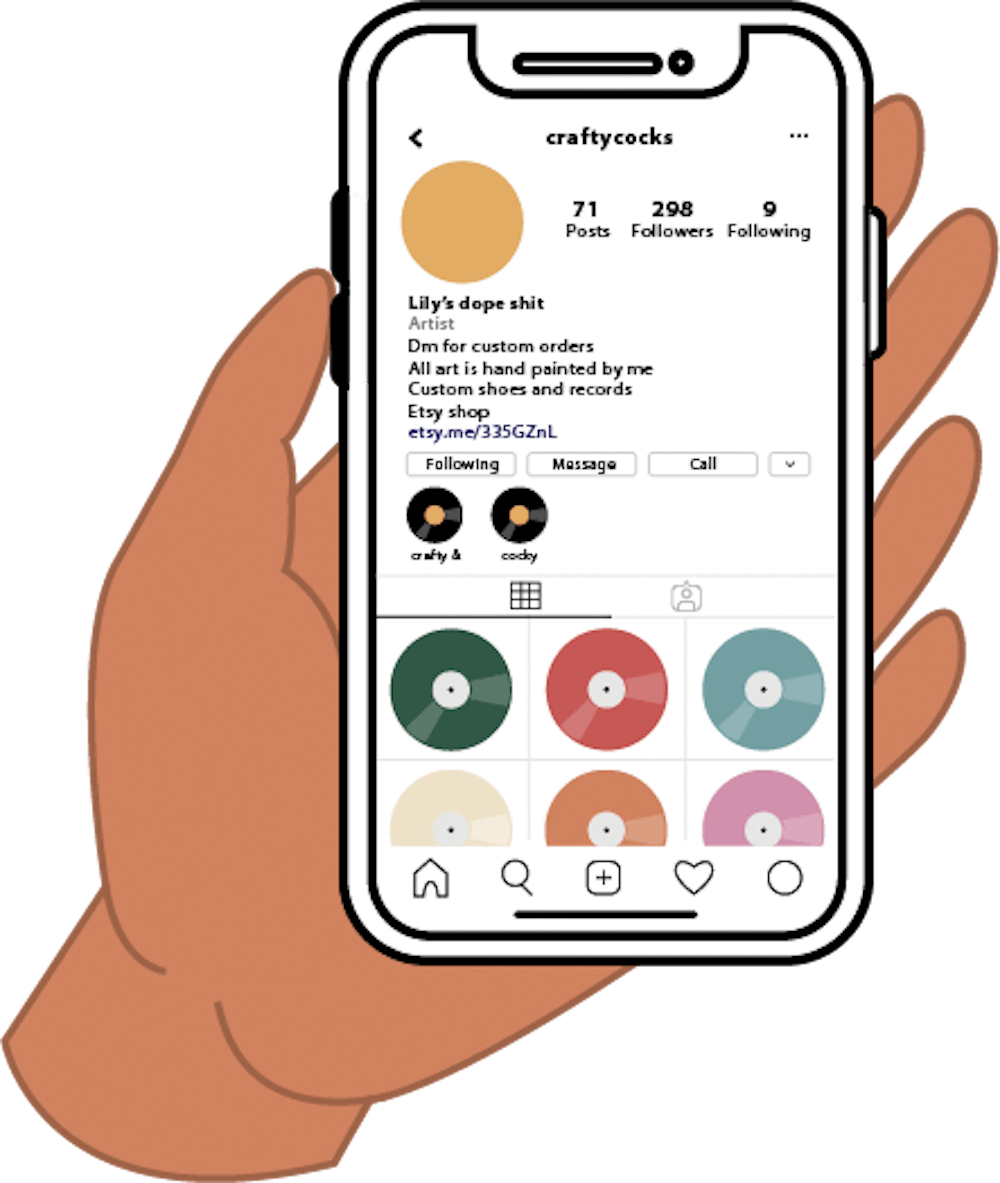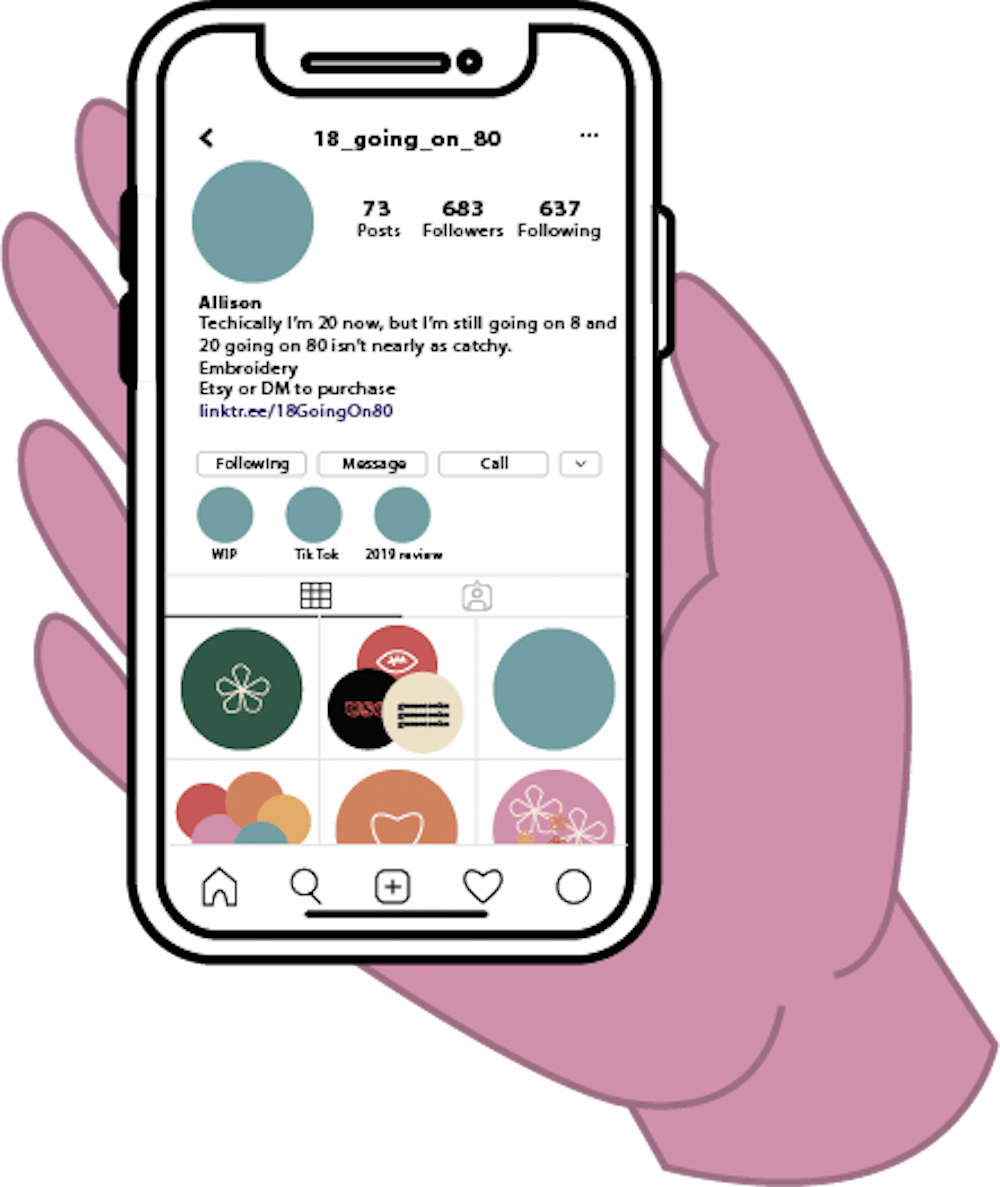Many students wish they could turn their hobbies and interests into a business. These four USC students have found ways to make that happen, and their advice to others is to do the same.
Lily Vincola, Crafty Cocks

For artist Lily Vincola, creating things has always been a passion, but it wasn’t until a year ago that she decided to start selling her work to others. Vincola said she and a roommate started painting designs on vinyl records for fun until they decided to turn it into something more.
“I’ve always wanted to create. And, as I grew up, I started taking more art classes ... There was nothing that I was gonna sell or anything. It was just in my classes, and I was like, 'Well, why don’t I just start actually incorporating that into a job and profiting from it?'” Vincola, a third-year visual communications student, said.
Vincola has since begun to run her Instagram business, Crafty Cocks, solo, and her records have become popular among college students. Recently, she received a large order from USC’s Delta Delta Delta sorority for 70 records for its Bid Day.
She draws inspiration for her designs from many places, but she said music and album covers always have a lot to offer.
While she spends a lot of time on her pieces, Vincola said she finds her work to be “very therapeutic.” To her, it is worth the sacrifices in time because it is something she is passionate about.
“You get out of it what you put into it. If you actually put your time and effort into it, you’re going to see something from it. You've really got to stick to it if you start it, and don’t give up on it. It takes time for it to grow. It doesn’t happen overnight,” Vincola said.

Allison Lambert, 18 Going On 80
Art comes in many forms, and one USC student has found a unique way to bring her designs to life. Third-year sports and entertainment management student Allison Lambert turned her embroidery hobby into small business "18 Going On 80" during quarantine when she noticed people had a genuine interest in the designs she was posting on Instagram.
According to Lambert, running a business on Instagram is a good starting point because of how easy it makes the networking process.
“Once you start talking to more people who are doing the same thing as you, it's really — it helps a lot. You start making friends and seeing what they're doing and how they're growing,” Lambert said.
Embroidery is an easy skill for beginners to learn, but it yields impressive results regardless of experience, Lambert said. Her designs are self-described as “simplistic and cutesy,” which she said appeals to her audience, and she also creates custom designs for people who ask.
Lambert said the hardest part about launching her small business was learning to place value on her work.
“You're always thinking to yourself, ‘I'll wait 'til I get better.’ But it's good now. The fact that you're thinking about making it into a business shows,” Lambert said.
Her advice to anyone wanting to start their own business is to be confident in their product and to just start, even if they think they are not ready.
Nick Rascona

The perks of running a small business go way beyond turning a profit. Take it from Nick Rascona, a fourth-year civil engineering student who is making money running a self-described "e-commerce business" selling items on a "secondary market."
“By doing this, I'm actually getting ahead. I'm teaching myself how to do my own accounting work and filing my own taxes, which in the long run is nice because all this is just taking it on a smaller scale, and then hopefully down the line, you're progressing these skills into something larger,” Rascona said.
Rascona had the idea to start his online business while he was looking through old belongings in his basement over winter break. After researching their worth, he realized he could profit if he sold them, and that is what he did. He now lists items on websites such as Ebay, Mercari and Poshmark.
While at school, Rascona spends about 20 hours a week sourcing products, researching trends and shipping packages. He searches mostly for electronics and shoes and sources them from many places, ranging from online wholesale shops to bricks-and-mortar thrift stores.
“I like doing a little bit of everything, just because another reason why I did this is just to keep my mind busy, keep it interesting,” Rascona said.
According to Rascona, the key to succeeding in e-commerce is time and effort. He said people cannot expect to “make a quick dollar” from simply listing an item online.
“I've noticed there's a direct correlation between the amount of time you put in and the amount of success that you'll output. And I've really taken that to heart ever since I've started doing this,” Rascona said.

Drake Bowen, Closet 90s
Some people are lucky enough to make money in a way that does not feel like work. Drake Bowen said he has always viewed Closet 90s, his thrifted clothing business, as a hobby.
“If I look at it as a job, then it kind of takes the whole purpose out of it,” Bowen, a third-year mass communications student, said.
Bowen started thrifting for himself in high school, but when he realized he had too much clothing, he and a friend decided to sell things on Instagram.
Most of what they list falls under the category of “high-end vintage” collectibles, and Bowen said they try to find clothing with “a story behind it.”
“I only buy stuff I would wear. That's my personal rule,” Bowen said.
Bowen often looks for clothing at Goodwill, Depop and Ebay but said it is becoming much harder to find quality pieces because more people “know what they have.”
“To find really expensive things is not that common anymore. Back in high school when I did it, it was really common. But the community is so big now that when I walk into a Goodwill, there's probably, you know, 10 other people my age that are looking for the same thing,” Bowen said.
While Bowen is not sure what the future holds due to the growing number of people thrifting, he said anyone looking to start their own business should not get discouraged, especially if they are doing something they genuinely enjoy.
“My advice would definitely be find something you love and start a business. If you're really passionate about it, and you stick with it, it'll work out,” Bowen said.

